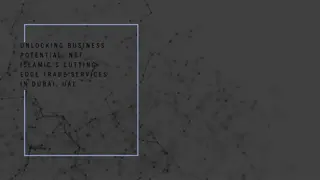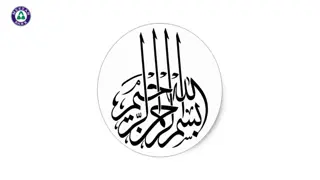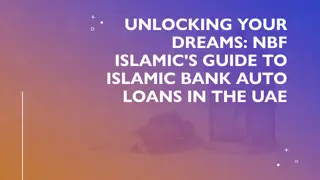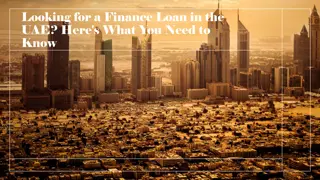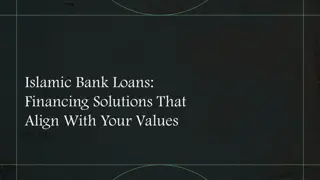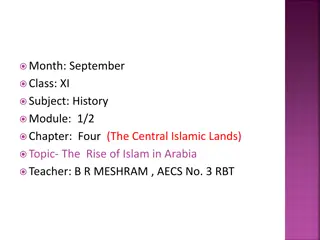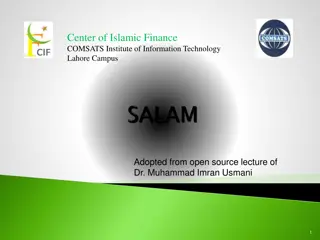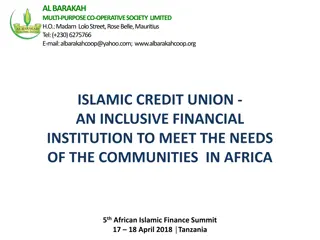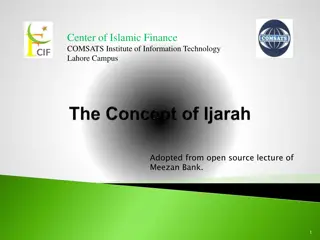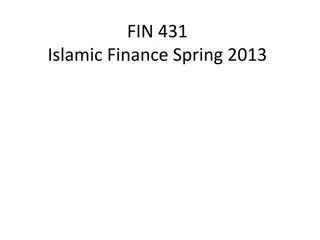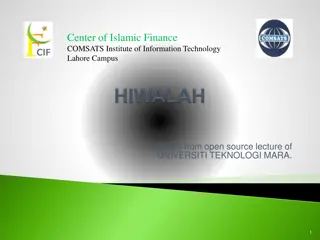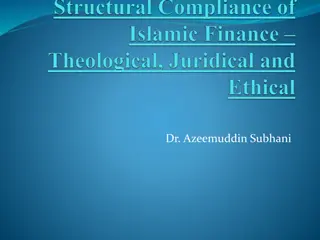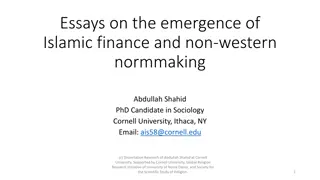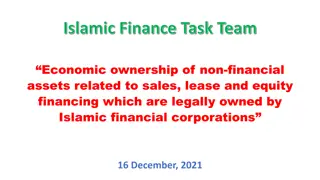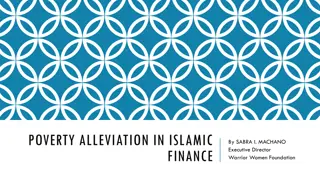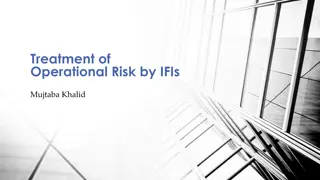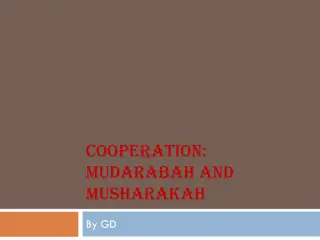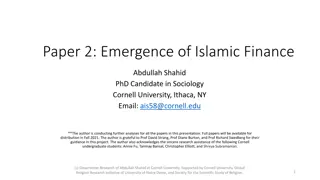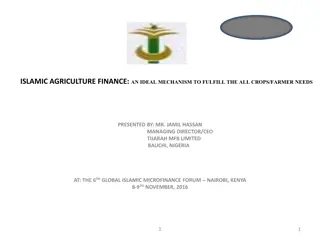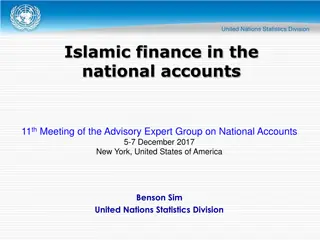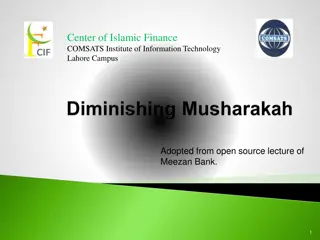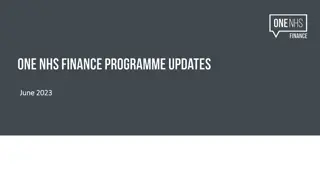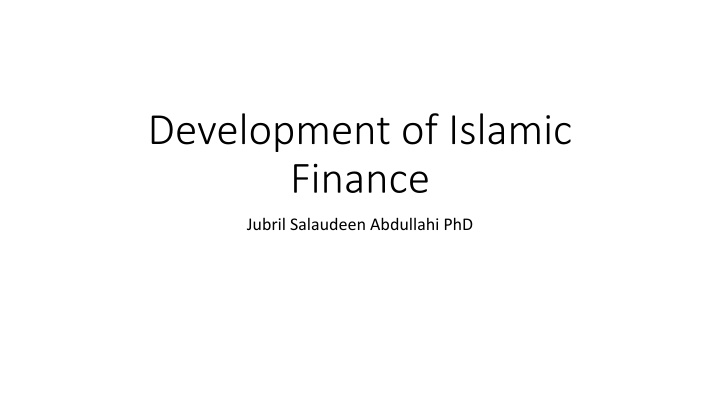
Evolution of Islamic Finance: From Pre-Islamic Arab Practices to Modern Innovations
Explore the historical development of Islamic finance, from pre-Islamic Arab financial systems to the introduction of modern Islamic banking, takaful, capital markets, microfinance, and fintech. Discover how Islamic finance focuses on eradicating riba (interest) and gharar (uncertainty), promoting fair markets, standardizing exchanges, and introducing new institutions like mudaraba and zakah. Uncover various attempts at implementing Islamic finance in countries like Egypt, Pakistan, and Nigeria. Dive into a snapshot of Islamic assets in 2018/2019 and a breakdown of global Islamic finance by sector and region.
Download Presentation

Please find below an Image/Link to download the presentation.
The content on the website is provided AS IS for your information and personal use only. It may not be sold, licensed, or shared on other websites without obtaining consent from the author. If you encounter any issues during the download, it is possible that the publisher has removed the file from their server.
You are allowed to download the files provided on this website for personal or commercial use, subject to the condition that they are used lawfully. All files are the property of their respective owners.
The content on the website is provided AS IS for your information and personal use only. It may not be sold, licensed, or shared on other websites without obtaining consent from the author.
E N D
Presentation Transcript
Development of Islamic Finance Jubril Salaudeen Abdullahi PhD
Outline Outline Pre Islamic Arab Finance Islamic Finance among Muslims Arabs Various efforts at Attaining modern Islamic Finance Islamic Banking across the world Takaful Around the world Islamic capital Market Islamic Micro Finance Islamic Fintech
Pre Pre- -Islamic Arab Islamic Arab Arabic Financial and economic system pre-Islam Trading based arrangements were common Bay al-musawamah (bargaining) Bay al-muzayadah (auctioning) Bay al-amanah (trust sale) Al-murabahah (resale with profit) Al-tawliyyah (resale at cost) Al-wadiah (resale at loss or below cost)
Islamic Focus on Finance Islamic Focus on Finance Eradication of riba institutions and practices Eradication of gharar transactions Institutionalization of fair and equitable markets No monopoly, fraud Standardization of money and commodity exchanges Islamization of many business organizations and institutions Mudaraba, musharaka, salam, muzara ah (sharecropping or partnership in agriculture), musaqah irrigation) New organizations and institutions were introduced Zakah, waqf and manihah Baitul-mal
Various Attempts at Islamic Finance Various Attempts at Islamic Finance Egypt : 25th July 1963 February 1967 - Mit ghamr Islamic Savings Bank started in Egypt by El Naggar - Based on German saving bank. Purpose to mobilize the idle savings of the majority of - Muslim within the Shari ah and to provide halal returns on their saving as well. Pakistan: 1950 s in the rural area of Pakistan : Pious landowners deposits their funds without interest rewards Credit was advanced to other poorer landowners for agricultural improvements Nigeria: Muslim Bank (West Africa) Limited. [1967]: The bank operated from William street Lagos and license was revoked
Snap shot on Islamic asset 2018/2019 Snap shot on Islamic asset 2018/2019
Brake Brake- -down of Global Islamic finance by sector/Region down of Global Islamic finance by sector/Region
Sectorial Composition of Global Islamic Finance 2019 Sectorial Composition of Global Islamic Finance 2019
Islamic Banking: Share in total Banking Asset Islamic Banking: Share in total Banking Asset (a) The countries in dark red coloured bars indicate those that satisfy the criterion of having a more than 15% share of Islamic banking assets in its total domestic banking sector assets and, hence, are categorised as systemically important (see footnotes 9, 10 and 11). (b) A recognition of systemic importance is considered for a jurisdiction that is within one percentage point of the 15% benchmark, provided it has active involvement (is among the top 10 jurisdictions) in the other two sectors of the IFSI Islamic capital markets and tak ful. Such jurisdiction, for instance Bahrain is shaded in grey bar. (c) Palestine, though within one percentage point of the 15% benchmark is not considered systemically important due to having no active involvement in the other two sectors of the IFSI. (d) Yemen, which has previously been classified as having achieved domestic systemic importance, is not Included in this IFSI Stability Report 2019, due to a lack of availability of credible data. Source: IFSB Secretariat Workings
Share of Global Islamic Banking assets 2018 Share of Global Islamic Banking assets 2018
Islamic Banking Asset 2008 Islamic Banking Asset 2008 - - 2018 2018
Comparison of Aggregate Growths of IB Comparison of Aggregate Growths of IB
Islamic Banking Around the world Islamic Banking Around the world Opportunities Challenges Introduce innovative methods and instruments to aid effective management of liquidity Lack of a developed interbank market for Islamic instruments Shortage of tradable instruments with low capital risk and predictable returns. Difficulty in international money market High transaction cost of some Financial instruments ( Commodity Murabaha, sukuk ijara) Trained work force especially in Africa Poor Branch network Less social impact on the community Sukuk-based trading platform that fits with the existing market practices and provides the advantage of reduced costs and better flexibility as compared to traditional practices. Uniform Shariah standards Financial inclusion Social inclusion Product development and engineering
Global Global Tak ful Tak ful Gross Contribution Gross Contribution,( ,(2011 2011 17) 17)
Takful Tak ful Contribution Contribution Region/Sector Region/Sector Tak ful Contribution by Key Region (2017) Tak ful Contribution/Total Sector Gross Premiums (%) (2017)
Takaful by Region/Operators Takaful by Region/Operators Number of Tak ful Operators by Region (2018) Number of Tak ful Operators and Windows Globally (2018)
Takaful in Sub Takaful in Sub- -Sahara Africa Sahara Africa Sub-Saharan Africa Tak ful operations are still insignificant in Sub- Saharan Africa, with the contributions estimated at USD 10.2 million in 2017 (mainly from Kenya, Nigeria and the Zambia). The region represents the greatest growth potential, with more than 50% of its population as Muslims. 1. Jaiz Takaful Insurance Plc 2. Noor Takaful Insurance 3. Salam Takaful Insurance Company limited 4. African Alliance Insurance Plc 5. Cornerstone Halal Takaful
Islamic Capital Market Islamic Capital Market The Islamic Capital Market (ICM) is an integral part of Islamic Financial System Shariah compliant financial assets are transacted. It is a market where people, companies, and governments with surplus funds transfer it to people, companies, or governments who have a shortage of funds. It acts as a financial intermediary by channeling money from surplus to deficit unit. The backbone of ICM is Shariah principles. The ICM functions as a parallel market to the conventional capital market for capital seekers and providers. The ICM attracts funds from domestic as well as international sources.
Islamic Capital Market SUKUK Issuance Islamic Capital Market SUKUK Issuance
Classes of Classes of Sukuk Sukuk Issuance 2005 Issuance 2005- -2018 2018 Sovereign uk k Issuance by Jurisdiction (2018) Corporate uk k Issuance Trend (2005-18)
Ten Ten- -year Historical Performance (2009 year Historical Performance (2009 19) 19) A 10-year horizon from Jan-2009 to Jan-2019, the S&P Global 1200 Shar ah Index Indicates higher returns than its conventional benchmark at 11.11%, compared to 10.29% returns generated by S&P Global 1200 during the same period. A similar long-term trend was also observed between other comparable conventional and Islamic indices.
Islamic equities Islamic equities The equity markets experienced extreme volatility in 2018, and a weak returns across global equity markets, a 12.5% drop in the FTSE All-World index, the biggest percentage decline to date since the GFC in 2008. Comparing Islamic indices with similar conventional indices, the Islamic equity markets did relatively better in 2018. Analysing the returns of Islamic equity indices versus conventional indices as well as the total returns over three-year and five-year horizons, while there was a considerable drop in returns in 2018 for both the conventional and Shar ah indices, the latter performed comparatively better across all indicators.
Islamic Fund Assets by Islamic Fund Assets by Asset Class Asset Class (2018) (2018)
Islamic Micro Financing Islamic Micro Financing Globally it s estimated that out of the 1.6 billion Muslims in the world, 14 % use banks, and that there are 650 million Muslims living on less than 2 dollars a day. Further advancing Islamic finance and Islamic microfinance, expanding formal banking, takaful options for those whose religion precludes them from conventional banking, would yield huge financial inclusion benefits.
Outreach of Islamic Outreach of Islamic Microfinance Microfinance by by Country 2007 Country 2007
Islamic Micro Islamic Micro- -Financing: Fighting Poverty Financing: Fighting Poverty Akhuwat: World s largest interest free micro-finance organization. The world must go to Pakistan to learn what Islamic Micro Finance is To help the poor around the world, we must quickly replicate the progress made by Dr. Muhammad Amjad Saqib of Akhuwat and his team around the world. https://akhuwat.org.pk/ There are other Islamic styled Micro finance institutions in different part of the world, providing services
Islamic Financial Technology Islamic Financial Technology Interest in fintech areas such as block-chain, cryptocurrencies, crowdfunding and rob-advice is growing fast, and with it interest in fintech s impact on Islamic financial services. As a result, countries including Bahrain and the UAE have launched initiatives in this area that have received a large volume of news coverage. This includes coverage of Shariah-compliant startups as part of the FinTech Hive at DIFC in Dubai, and the launch of ALGO Bahrain: Shariah Scholars must becareful not to kill innovation with regulation
Thank you for listening MD/CEO SecureHuda Limited www.securehuda.com.ng Jubril A. Salaudeen

